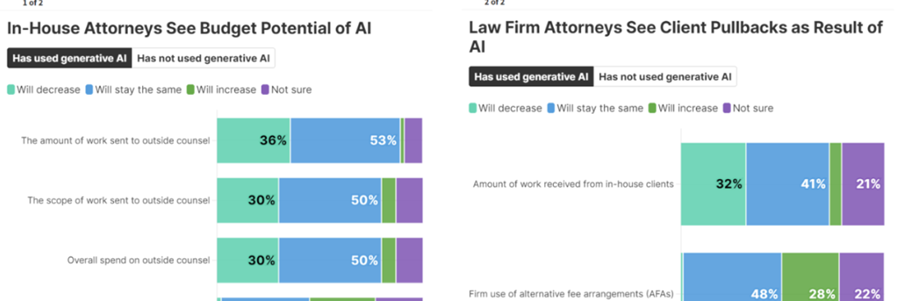
InterAlia Insight on Generative AI's and the Market for Legal Services
Generative AI’s Effect on Legal Services: Decreasing Demand, Increasing AFAs?
Generative AI will decrease the amount of work that in-house legal departments will send to law firms. Decreased demand will lead to more negotiations about fee arrangements.
Vienna, 15 November 2023 - Navigating shrinking budgets and increasing legal fees is a major and difficult challenge for most in-house legal leaders. Could Generative AI ease that pain and if so, what potential effect that could have on the legal market?
Many analyses about the likely impact of Generative AI on legal billings focus on the question whether and how the suppliers, the law firms will use the technology and how transparently they will do so. Market analysts debate the effect on the practice of hourly billing, and regulators started to issue requirements of applying alternative fee arrangements if Generative AI was used in the legal matter.
However, the bigger effect on billing practices might come from a potential decrease in the demand for legal services and thus from tighter competition. Last week, Bloomberg Law published an interesting summary of related findings in their 2023 State of Practice Survey.
In the course of their research, Bloomberg Law has asked in-house legal leaders and law firm partners about the likely effect of Generative AI on the volume, type, and pricing of work outsourced to law firms. The findings are particularly important for law firm leaders.
First of all, the opinion of those who have already tested the technology significantly differs from the views of those who haven’t – the gap being equally present in the in-house and the law firm respondents’ groups. Maybe Generative AI is a technology that you have to experience yourself to become a believer, maybe it’s the headlines about hallucination that the non-testers’ opinions are based on.
36% of in-house legal leaders who have already tested Generative AI technology believe that the amount of work outsourced to external counsel would decrease as a result of AI adoption, 53% say that it would stay the same.
Additionally, 32% believe that as a result of decreased demand, the negotiation power of in-house legal teams would increase and that would lead to alternative fee arrangements being more commonly used. In this question, 43% of AI-experienced respondents expect no changes.
Decreasing demand and increased usage of AFAs are seen as likely consequences of Generative AI’s adoption by clients. Respectively, 35% and 28% of lawyers in law firms who have used generative AI tools already share this opinion, aligning with their in-house colleagues.
If the predictions are right, we will see corporate legal teams continuing to replace external counsel or other vendors in more and more legal tasks. According to a frequent quote, it’s not AI that will replace lawyers, but lawyers using AI will replace lawyers who don’t. With regard to the Bloomberg Law survey’s findings, it’s the in-house lawyers who use Generative AI replacing law firm lawyers – particularly if the latter are not using Generative AI or other type of technologies.
Bildernachweis
| Image | Copyright | Autor |
| ###IMAGE### | ###COPYRIGHT### | ###AUTHOR### |